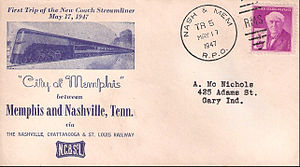City of Memphis (train)
This article includes a list of general references, but it lacks sufficient corresponding inline citations. (January 2014) |
 First trip of the streamlined City of Memphis, May 17, 1947 | ||||||||||||||||||||||||||||||||||||||||||||||||||||||||||||||||||||||||||||||||||||||||||||||||||||||||||||||||
| Overview | ||||||||||||||||||||||||||||||||||||||||||||||||||||||||||||||||||||||||||||||||||||||||||||||||||||||||||||||||
|---|---|---|---|---|---|---|---|---|---|---|---|---|---|---|---|---|---|---|---|---|---|---|---|---|---|---|---|---|---|---|---|---|---|---|---|---|---|---|---|---|---|---|---|---|---|---|---|---|---|---|---|---|---|---|---|---|---|---|---|---|---|---|---|---|---|---|---|---|---|---|---|---|---|---|---|---|---|---|---|---|---|---|---|---|---|---|---|---|---|---|---|---|---|---|---|---|---|---|---|---|---|---|---|---|---|---|---|---|---|---|---|---|
| Service type | Inter-city rail | |||||||||||||||||||||||||||||||||||||||||||||||||||||||||||||||||||||||||||||||||||||||||||||||||||||||||||||||
| Status | Discontinued | |||||||||||||||||||||||||||||||||||||||||||||||||||||||||||||||||||||||||||||||||||||||||||||||||||||||||||||||
| Locale | Tennessee | |||||||||||||||||||||||||||||||||||||||||||||||||||||||||||||||||||||||||||||||||||||||||||||||||||||||||||||||
| First service | 1947 | |||||||||||||||||||||||||||||||||||||||||||||||||||||||||||||||||||||||||||||||||||||||||||||||||||||||||||||||
| Last service | 1958 | |||||||||||||||||||||||||||||||||||||||||||||||||||||||||||||||||||||||||||||||||||||||||||||||||||||||||||||||
| Former operator(s) | Nashville, Chattanooga and St. Louis Railway | |||||||||||||||||||||||||||||||||||||||||||||||||||||||||||||||||||||||||||||||||||||||||||||||||||||||||||||||
| Route | ||||||||||||||||||||||||||||||||||||||||||||||||||||||||||||||||||||||||||||||||||||||||||||||||||||||||||||||||
| Termini | Memphis, Tennessee Nashville, Tennessee | |||||||||||||||||||||||||||||||||||||||||||||||||||||||||||||||||||||||||||||||||||||||||||||||||||||||||||||||
| Distance travelled | 236.8 miles (381.1 km) | |||||||||||||||||||||||||||||||||||||||||||||||||||||||||||||||||||||||||||||||||||||||||||||||||||||||||||||||
| Average journey time | 5 hrs 00 min | |||||||||||||||||||||||||||||||||||||||||||||||||||||||||||||||||||||||||||||||||||||||||||||||||||||||||||||||
| Service frequency | Daily | |||||||||||||||||||||||||||||||||||||||||||||||||||||||||||||||||||||||||||||||||||||||||||||||||||||||||||||||
| Train number(s) | Eastbound: 105-5, Westbound: 106-6 | |||||||||||||||||||||||||||||||||||||||||||||||||||||||||||||||||||||||||||||||||||||||||||||||||||||||||||||||
| On-board services | ||||||||||||||||||||||||||||||||||||||||||||||||||||||||||||||||||||||||||||||||||||||||||||||||||||||||||||||||
| Seating arrangements | Reclining Seat Coaches | |||||||||||||||||||||||||||||||||||||||||||||||||||||||||||||||||||||||||||||||||||||||||||||||||||||||||||||||
| Catering facilities | Tavern-dining car | |||||||||||||||||||||||||||||||||||||||||||||||||||||||||||||||||||||||||||||||||||||||||||||||||||||||||||||||
| Technical | ||||||||||||||||||||||||||||||||||||||||||||||||||||||||||||||||||||||||||||||||||||||||||||||||||||||||||||||||
| Track gauge | 1,435 mm (4 ft 8+1⁄2 in) | |||||||||||||||||||||||||||||||||||||||||||||||||||||||||||||||||||||||||||||||||||||||||||||||||||||||||||||||
| ||||||||||||||||||||||||||||||||||||||||||||||||||||||||||||||||||||||||||||||||||||||||||||||||||||||||||||||||
The City of Memphis was a 236.8-mile (381.1 km) passenger train route operated by the Nashville, Chattanooga and St. Louis Railway connecting Nashville's Nashville Union Station and Memphis, Tennessee's Memphis Union Station.[1]
History
[edit]The City of Memphis was powered by one of the last steam locomotives ever streamlined.[2] The six cars were all rebuilt and streamlined by the NC&StL shops from heavyweight cars. The six cars were originally Pullman Heavyweight Parlor Cars before purchase by the NC&STL for conversion to coaches in June 1941.[3]
The six car consist had a revenue seating capacity of 204 and was built to operate on a fast five-hour schedule between Nashville and Memphis a distance of 239 miles (385 km). The train set operated a daily round trip and lasted beyond the 1957 Louisville and Nashville Railroad takeover of the NC&StL, although the name was removed from the service by 1955.[4]
Equipment
[edit]
|
To equip the train the railroad rebuilt six heavyweight Pullman parlor cars. The resulting train consisted of a baggage-mail car, a coach-dinette-lounge, two 56-seat coaches, a dining-tavern car, and a coach-lounge-observation car. Several of the train's cars survive, including the coach-lounge-observation, which is part of the collection of the Tennessee Valley Railroad Museum in the Chattanooga area.[6]
Notes
[edit]- ^ 'Official Guide of the Railways,' August 1949, Nashville, Chattanooga & St. Louis section
- ^ Holland 2003, p. 58
- ^ Rieves 2000, p. 60
- ^ Rieves 2000, p. 62
- ^ Rieves 2017, p. 104
- ^ a b Wayner 1972, p. 104
References
[edit]- Holland, Kevin J. (2003). "The Frugal Approach". Classic Trains Special Edition. No. 1, Dream Trains. ISSN 1541-809X.
- Rieves, George (Summer 2000). "City of Memphis: The Budget Streamliner". Classic Trains. Vol. 1, no. 2. ISSN 1527-0718.
- Rieves, George (2017). "The Budget Streamliner". In McGonigal, Robert S. (ed.). Great Trains Heartland. Waukesha, Wisconsin: Kalmbach Publishing. pp. 102–105. ISBN 978-1-62700-497-8.
- Wayner, Robert J., ed. (1972). Car Names, Numbers and Consists. New York: Wayner Publications. OCLC 8848690.
External links
[edit]- 1950 timetable
- Burns, Adam. "The NC&StL's City of Memphis". AmericanRails.com. Retrieved 4 January 2014.
- Condren, Mike. "Nashville Chattanooga & St. Louis Passenger Trains - City of Memphis Streamliner". Mike Condren's Railroad Pages. Retrieved 4 January 2014.
- "The "City Of Memphis" Stream-Lined Passenger Train". TheWatchers.com. Retrieved 4 January 2014.
